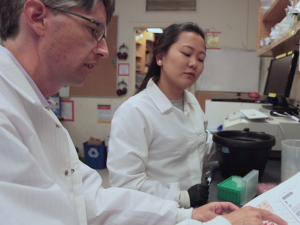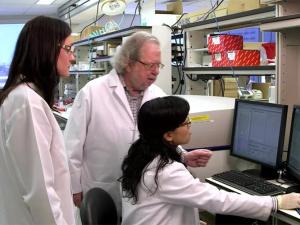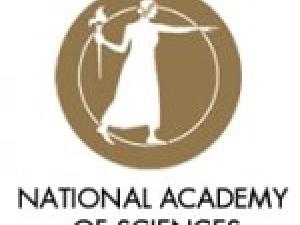

Research Bio
Daniel A. Portnoy is a microbiologist and immunologist who studies the cellular and molecular mechanisms of host–pathogen interactions. He is best known for groundbreaking research on Listeria monocytogenes, which revealed how intracellular pathogens invade, replicate, and evade immune defenses. His lab pioneered genetic and molecular approaches to study innate immunity, including the discovery of pathways that activate host cell defenses against bacterial infection. Portnoy’s work has had major implications for understanding bacterial pathogenesis, inflammation, and the development of vaccines and therapeutics. His research integrates microbial genetics, immunology, and cell biology to dissect how pathogens subvert host processes.
Portnoy is a Professor of Plant & Microbial Biology and Molecular & Cell Biology at UC Berkeley. He is a member of the National Academy of Sciences, National Academy of Inventors and a Fellow of the American Academy of Microbiology. His research has been published in Science, Nature, and Cell. He has received awards such as the NIH MERIT Award and has trained numerous graduate students and postdocs who lead labs around the world.
His expertise spans microbiology, immunology, and host–pathogen interactions.
Research Expertise and Interest
microbiology, bacteriology, infectious diseases, intracellular pathogens, innate immunity, adaptive immunity, vaccines, cell biology
In the News
Listeria Bacteria Leads to Unique Cancer Therapy
Three innovators elected to National Academy of Inventors
The yin-yang of cancer and infectious disease
Aduro Biotech helps launch new immunotherapy, vaccine effort
UC Berkeley cancer immunologists are teaming up with colleagues working on infectious disease to create a new Immunotherapeutics and Vaccine Research Initiative.
Three faculty members named to National Academy of Sciences
In recognition of their excellence in original scientific research, three UC Berkeley faculty members have been elected members of the National Academy of Sciences (NAS), one of the highest honors given to a scientist or engineer in the United States.
New bacterial signaling molecule could lead to improved vaccines
In a 20-year quest to determine why Listeria bacteria produce a uniquely strong immune response in humans, UC Berkeley scientists have found part of the answer: an unsuspected signaling molecule that the bacteria pump out and which ramps up production of interferon by the host. Interferon mobilizes the immune system to fight off bacteria and viruses.
Featured in the Media
Some of the bacteria in our gut, including ones that are used to ferment yogurt or probiotics, generate electricity, a team of Berkeley researchers has discovered. While so-called "electrogenic" bacteria are known to exist in remote places, like the bottom of lakes, it wasn't previously known that bacteria in decaying plants, or in mammals, were also creating electricity, and in a much simpler way, says molecular and cell biology professor Daniel Portnoy, the study's senior author. While the key reason for bacteria to do this is in order to create energy, it may also remove electrons produced by metabolism, Professor Portnoy says. And, according to postdoctoral researcher Sam Light, the study's lead author, it is "probably a back-up system that they use under certain conditions," like the low-oxygen environment of the gut. While raising all kinds of new questions about the body and life on Earth, the study is also spurring interest as a new path for renewable energy technologies. For more on this, see our press release at Berkeley News. Stories on this topic have appeared in a couple dozen sources, including Medicine News Line, Daily Mail Online, and Research & Development.





